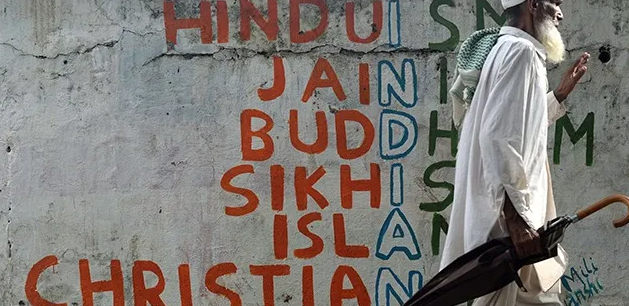Neighbourhood on Edge (GS Paper 2, Polity)

Context:
- This editorial criticizes the rise of religious nationalism in India, Pakistan, and Bangladesh, emphasizing its negative impact on democracy, societal harmony, and regional stability.
The Precarious State of South Asia: A Shared Political Crisis
- South Asia finds itself on the edge of a crisis as India, Pakistan, and Bangladesh experience the rise of religious nationalism.
- This growing trend poses a threat not only to the democratic structures in these countries but also to societal harmony.
- Despite their distinct histories and cultural differences, these nations are increasingly sharing a common political issue: escalating religious conflict and rising authoritarian tendencies.
- The rise of religious nationalism in these countries brings to mind the traumatic experience of the 1947 Partition, which continues to fuel targeted violence and instability rather than promoting freedoms and human rights.
- The shared ideological fates of these countries make their individual crises inseparable from one another, linking their internal political struggles to regional dynamics.
Bangladesh: Democracy in Decline and Rising Religious Tensions
Political Instability and Declining Legitimacy
- In Bangladesh, under Sheikh Hasina’s regime, democracy is facing a significant crisis.
- The government's waning popular legitimacy has left the nation uncertain about its future political direction.
- There is a history of political friction between the ruling Awami League and its opponents, further weakening the country’s democratic fabric and making future governance uncertain.
Increasing Influence of Islamist Forces
- At the same time, Islamist forces are gaining more influence in Bangladesh.
- Without strong counterbalancing political forces, minorities—especially Hindus—are becoming increasingly vulnerable.
- The state elites often downplay these threats, attributing them to Indian disinformation, following a typical South Asian pattern of deflecting responsibility for communal violence.
The Role of Secularism and the Vulnerability of Minorities
- Performative secularism in Bangladesh masks deeper insecurities, as the government struggles to protect minorities while appeasing Islamist forces.
- This situation poses long-term risks for the Hindu community and other vulnerable groups.
India: Majoritarianism and Internal Polarization
Hindutva Ideology and the Growing Divisions
- In India, the rise of Hindutva ideology is reshaping the country’s politics.
- Far from being a genuine concern for the welfare of minorities in neighboring Bangladesh, India’s internal political shift towards majoritarianism is evident in incidents such as lynchings, the bulldozing of minority homes, and the reclamation of religious sites.
The Weaponization of Religious Nationalism
- The Waqf Board reform is a prime example of how religious issues are weaponized to marginalize minorities, making legitimate concerns serve the interests of a Hindutva agenda.
- The aftermath of the Ayodhya dispute further highlights how religious nationalism requires continuous victories at the cost of social and political settlements.
Consequences for Regional Stability
- India’s growing communal divide not only destabilizes its internal unity but also emboldens religious nationalism in neighboring countries.
- This vicious cycle of religious identity politics could lead the region into further conflict and polarization.
Pakistan: A State Trapped in Its Own Ideological Constructs
Religious Ideology and Minority Persecution
- Pakistan presents a cautionary example of a state where religious ideology has been used as the foundation of governance.
- The state has systematically targeted minorities, including Ahmadiyyas, Shias, and others.
- The sectarian violence in regions like Kurram is a tragic reminder of the devastating consequences of such ideological approaches.
Internal Divisions and Fragility
- The divide between popular sentiment and military legitimacy exacerbates Pakistan’s internal fragility.
- As Pakistan exhausts external minority scapegoats, its internal divisions have become the new targets for sectarian violence, which is contributing to the state's unstability.
A Region Bound by Ideological Spirals
Interconnected Ideological Pathways
- India, Pakistan, and Bangladesh, despite their distinct political paths, are ideologically interconnected.
- India’s Hindutva agenda fuels Pakistan’s religious statehood and Bangladesh’s Islamist resurgence.
- In turn, these nations continue to define their identities in opposition to India, thus reinforcing each other's authoritarian tendencies and perpetuating religious nationalism.
Mutual Antagonism and Its Consequences
- This mutual antagonism creates a vicious cycle that undermines democratic renewal and perpetuates conflict and authoritarianism.
- The ideological connections between these countries hinder any potential for constructive dialogue and cooperation, leaving little space for democratic revitalization in the region.
The Regional Impact of Religious Nationalism
Lessons from South Asia’s History
- The history of South Asia offers a clear warning: state-sponsored religious nationalism inevitably leads to authoritarianism, repression, and the erosion of democracy.
- If India, Pakistan, and Bangladesh continue down this path, they will further entrench the divisions that have defined their shared history since 1947.
Need for Collective Introspection and Action
- To break free from this cycle, collective introspection and action are necessary.
- The nations of South Asia must move away from religious nationalism and towards inclusive secularism, focusing on human rights and democracy to address the challenges that face the region.
- Failure to do so risks further destabilizing the region and deepening the divisions that continue to haunt their shared past.
Conclusion:
- South Asia stands at a crucial crossroads, where the rise of religious nationalism threatens the democratic values and stability of the entire region.
- To ensure a peaceful and democratic future, these nations must reject religious nationalism and embrace secularism, inclusivity, and human rights, forging a path towards regional cooperation and stability.


